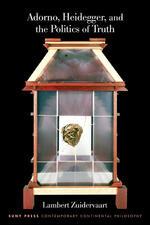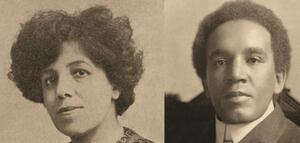
Hope for Truth in a Post-Truth World
Guest Post by Lambert Zuidervaart
Four decades have passed since I gave my first conference paper on Theodor W. Adorno. It was on the idea of artistic truth in Adorno’s Aesthetic Theory, and I presented it at the 1982 meeting of the American Society for Aesthetics in Banff, Alberta. Susan Buck-Morss and Martin Jay, two leading scholars in Critical Theory whom I met there for the first time, were the expert and gracious commentators.
Few others at the conference had read much by Adorno, however; the first English translation of his Aesthetic Theory did not appear for another two years. As a newly minted PhD who had done most of my doctoral research and writing in West Berlin, I needed to make Adorno’s thought intelligible to an English-speaking audience. That became a lifelong project.
Adorno’s writings are notoriously difficult to understand. He wrote mostly in German and within a German philosophical tradition; he deliberately cultivated a provocative and idiosyncratic style; and the initial translations of his major works—Negative Dialectics and Aesthetic Theory—were deeply flawed. Moreover, his central concepts challenge the Western philosophical tradition, and they lie well outside the mainstreams of contemporary Anglo-American philosophy.
This is especially so of Adorno’s idea of artistic truth, the topic of my conference paper in Banff. As a gifted musician who wrote extensively on modern music, art, and literature, Adorno believed artworks present truth that scientific and philosophical discourse cannot replicate or replace. Moreover, artistic truth is crucial to the critique and redirection of a false society, he claimed. Already here we have two notions of truth—artistic truth and societal truth—that are foreign to analytic philosophy. Most analytic philosophers limit the notion of truth to that which can be stated or asserted in language, to what we can call propositional truth.
As my attempts to explain Adorno’s idea of artistic truth turned into the book Adorno’s Aesthetic Theory (MIT Press, 1991), I became convinced of two things. First, that Adorno was largely right about art’s capacity to carry truth, and second that, building on his thought, I needed to develop my own conception of artistic truth and present it to my colleagues in Anglo-American aesthetics. This led to a book titled Artistic Truth (Cambridge UP, 2004).
That was just the beginning, however. To argue that artistic truth is both different from propositional truth and legitimate in its own right, one really needs to offer a comprehensive conception of truth as a whole within which we can distinguish artistic truth from other sorts of truth. So I set out to do this, eventually publishing several books on the topic, most importantly Truth in Husserl, Heidegger, and the Frankfurt School (MIT Press, 2017) and Social Domains of Truth: Science, Politics, Art, and Religion (Routledge, 2023).
Adorno, however, never clearly spells out his own conception of truth as a whole, despite its centrality to his philosophy, aesthetics, and social critique. Having used Adorno’s work to build a new conception of artistic truth and then having situated my conception in a more comprehensive account of truth as a whole, I now faced two challenges. First, could I make intelligible Adorno’s implicit conception of truth as a whole and situate his idea of artistic truth within this? Second, could I demonstrate both the connections and the differences between his comprehensive conception and my own?
Adorno, Heidegger, and the Politics of Truth takes up both challenges. Through close, selective readings of Negative Dialectics, Aesthetic Theory, and Adorno’s lecture courses from the 1960s, I systematically reconstruct his comprehensive conception of truth. I also sort out what, in light of my own comprehensive conception, Adorno’s approach can offer in an allegedly post-truth society.
Despite his harsh critique of capitalist society, Adorno never gave up hope for what he called “the humanly promised other of history.” He hoped that, in the end, truth would prevail. Although I would state it differently, I share this hope. My new book on Adorno tries to show why and how.
Lambert Zuidervaart is Emeritus Professor of Philosophy at the Institute for Christian Studies and the University of Toronto, a Visiting Scholar at Calvin University, and the creator of the Love [of] Wisdom blog. His most recent books include Social Domains of Truth: Science, Politics, Art, and Religion, Shattering Silos: Reimagining Knowledge, Politics, and Social Critique, and Truth in Husserl, Heidegger, and the Frankfurt School. He lives in Grand Rapids, Michigan.


